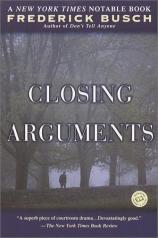Reading Group Guide
Discussion Questions
Closing Arguments

1. In the entry entitled "The Braid," Marcus Brennan recounts watching his mother braid her hair. Do you see any significance between that memory and the way Brennan structures his narrative? What are the strands of narrative in the novel? By using this structure, what does Frederick Busch accomplish in terms of directing the reader's experience of Brennan's story?
2. The novel contains many scenes of characters being compelled to write "the truth" and then having their writing and the motives behind it questioned. How does this color your response to the novel, which is itself another truth-telling? Is this final version of Brennan's "truth" credible to you? Why?
3. Where do you place Brennan's captivity, his interrogation, and torture in the time frame of the narrative? Are these his manufactured memories or a metaphor for his current life? When exactly is Goblin shot down? Do the characters in the jungle scenes have counterparts in Brennan's exterior life?
4. When Marcus and Estella meet for the first time, he notices that she brightens, literally, after he rudely derides the disapproving prison guard: "I turned back to my client. She was beaming. Color came into her face, even her lips, which had been quite pale. Her eyes looked lively for an instant." What is being communicated between the two of them here? Discuss how the ebb and flow of Estella's association with certain colors translates into an emotional barometer over the course of the novel.
5. What does the violence of Estella and Marcus's relationship unlock for him?
6. The image of shoes is repeated with growing importance as the novel progresses. Discuss the way the image gains importance as the story unfolds. What do you make of Marcus stealing the laces from his son's shoes to carry out his final plans?
7. Every member of the Brennan family seems isolated from the others, trapped in his or her own inescapable web of stories, and yet they try to touch one another through the context of their falsehoods. Identify those stories and the way they are used by each character to both reach out and stay safe simultaneously. What does it say about Marcus that he is so slow to comprehend that his daughter has been lying to him?
8. Which of Brennan's actions, if any, do you find defensible? Is he a sympathetic character? Empathetic? Is there any particular point in his confession at which you felt his character was beyond redemption? What of the other characters? Can you distinguish a single, overarching motive that unites these people?
9. War takes on an agency here that makes it more of a character than a setting. Consider where Brennan's references to war appear: the jungle and the courtroom. Consider also the moment in which he first sees and then "rescues" Rochelle at the antiwar demonstration. Why does Marcus, who never went to war, associate with it so intensely? Why do you think Marcus chose law as his profession?
10. In her closing argument for the prosecution, the assistant district attorney states, "Laws are not to be broken. Anything else, outside the law, is just words, just stories." Discuss this idea in terms of what you've learned about the idea of story through the novel.
11. In the end, do you think Marcus was more fearful of being found out a liar or having to own up to the abuse of his childhood? Does this offer any clue as to his understanding of how to arm "the weapon" that is Estella? Which is the more dreadful admission: what we did or what we couldn't do?
12. You the reader are the "Dear Rochelle" to which the novel is ultimately addressed. Taking the intimacy of this shared perspec-tive to its natural conclusion, how do you respond to Marcus and this novel? What is your closing argument?
Closing Arguments
- Publication Date: February 10, 1993
- Paperback: 288 pages
- Publisher: Ballantine Books
- ISBN-10: 0449907503
- ISBN-13: 9780449907504







